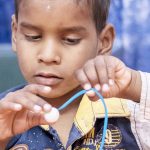
Inclusion in mainstream education is an extended process that begins with acknowledging that all children have the right to education, interaction with others their age, and participation in every aspect of community life. At the Latika Roy Foundation (LRF), our Wabi-Sabi Inclusion Program helps prepare our children academically, socially and emotionally for the transition into mainstream education. We also work with mainstream school principals, staff, school children and their parents to make the transition as smooth as possible.
Sachin*, 9, formerly at Karuna Vihar, the Foundation’s special school, left for mainstream school because his mother wanted a place with longer timings. A day in, she was told her son was a “burden” they were unwilling to bear. We stepped in with a choice of schools, one of which was Happy Minds*, where we’ve placed children in the past, share a close equation with the management and interact frequently with the staff. Sachin’s individualized Knowing Me Better booklet gave his new teachers all the information they needed about him. His new Principal was invited to Wabi-Sabi’s Anek Titliyaan symposium on inclusion. She was so impressed that she expressed an interest in being invited as a speaker at the next event.
When Sachin was admitted to Nursery instead of Class 3 where his classmates would have been the same age as him, we negotiated with the school to move him to KG and have lunch with the older children so that he wouldn’t feel different. Two days in, we were informed that Sachin was behaving inappropriately with the other children. Since the school chose to address the situation internally, we continued counselling his mother on ways to help children with Down Syndrome like Sachin learn best. His behavioral issues appeared to improve as he settled into his new environment.
A few months later, however, the Principal called to say that the family of one of his classmates had complained that he’d so terrorized her that she refused to come to school. Her father threatened to instigate other parents to withdraw their children and sue us for denying his child her right to education. In fact, Sachin’s difficulties with even rudimentary communication preclude the possibility that he could threaten anyone. Our investigations revealed that Sachin was being made the scapegoat, as is frequently the case with disabled children, by a family that wanted to withdraw their child without paying their arrears.
We observed Sachin’s behavior in class, conducted a sensitization workshop for the children, and recommended that he be allowed to sit with children his own age while pursuing a less advanced curriculum. Since he’s in a very small school with open plan seating, the Nursery teacher can go in and out to keep him on track with his academic work. His challenging behavior was exacerbated by children who picked on him or complained for trivial reasons. One child said, “Sachin, tu ja yahan se (Go away, Sachin)”. When we asked where he should go, she shrugged, saying, “Pata nahin (I don’t know)”.
Sachin’s on-going struggle illustrates the formidable challenges intrinsic to inclusion. The obstacles are staggering, with lack of awareness, sensitivity and training at the tip of the iceberg. Progress can be slow; every success, hard won. Our efforts often unfold as a step forward and two back. It’s a long road, but one that must be walked for a better world for children with disabilities.
* Identity protected on parent’s request.



Thanks for this story, Jo.
Someone who writes a great deal about inclusion, particularly within education, wrote about when a child’s placement is at risk of failing in school. (Annoyingly, I can’t remember his name right now!)
He pointed out that when a situation breaks down, some people see that as proving that inclusion can’t work. But his response is that if a child’s inclusion does indeed ‘fail’, then it wasn’t inclusion in the first place. We didn’t get it right. Yet.
Yes, the journey towards becoming more inclusive will indeed meet all sorts of obstacles. And we must never allow individual children to be hostages to a principle, however important that principle may be. But that doesn’t mean that the journey is the wrong one to be on – and a vital one for all of us.